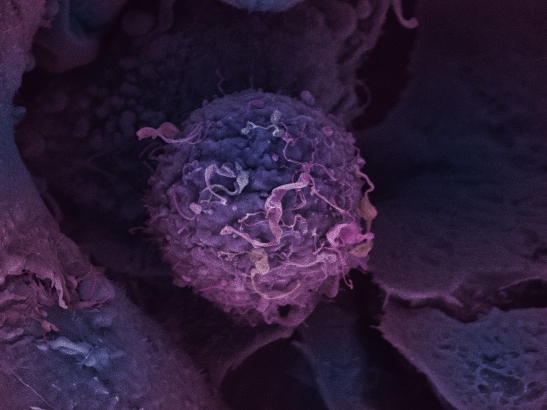
Image: Breast cancer cell. Credit: Anne Weston, Francis Crick Institute via the Wellcome Collection
Analysing cancer DNA in spinal fluid could speed up and improve the diagnosis of breast cancer which has spread to the brain and spinal cord, according to a new pilot study.
The type of test, known as a liquid biopsy, is more accurate than current methods used to diagnose this type of breast cancer, where it has spread to the lining of the brain and spinal cord.
This method would allow a diagnosis at an earlier stage, when patients are more likely to benefit from treatment.
In the new study, researchers at The Institute of Cancer Research, London, analysed cancer DNA present in samples of spinal fluid from breast cancer patients with suspected leptomeningeal metastasis – where cancer cells have spread to the leptomeninges, a thin layer of tissue that covers the brain and spinal cord. They assessed the ability of liquid biopsies to accurately diagnose and guide treatment of the disease.
Correct diagnosis in 100 per cent of cases
Though further research is needed, scientists believe the test could aid the diagnosis of advanced stages of other cancers that commonly spread to the brain, such as lung cancer and melanoma skin cancer, or cancers that originate in the brain, such as glioblastoma.
The study is published in the journal Clinical Cancer Research, and was funded by the Medical Research Council, Breast Cancer Now, and the National Institute for Health Research Biomedical Research Centre at The Royal Marsden NHS Foundation Trust and The Institute of Cancer Research (ICR).
The team analysed samples of the spinal fluid of 30 breast cancer patients with suspected leptomeningeal metastasis, and measured the amount of cancer DNA present in the samples. They found that the spinal fluid liquid biopsy correctly diagnosed 100 per cent of positive cases, and correctly refuted diagnosis in all negative cases.
Leptomeningeal metastasis occurs in about five to ten per cent of patients who have breast cancer that has spread to other parts of the body. It has a very poor outcome, with patients only surviving three to four months, on average, after diagnosis.
A more rapid diagnosis
The standard tests currently used to diagnose leptomeningeal metastasis are lumbar puncture cytology – where spinal fluid is collected from the lower back using a needle and then analysing it under a microscope – and MRI scans. Tumour cells are only correctly detected using cytology in about 50 per cent of cases and MRI findings can be inconclusive.
As a result, patients often have to undergo repeated lumbar punctures for a definitive diagnosis. This invasive procedure can lead to the disease being diagnosed at a late stage, when patients are too unwell to have treatment.
The new liquid biopsy would mean each patient only needing to have one lumbar puncture to reach a definitive diagnosis, allowing a diagnosis far more quickly than through current methods.
Liquid biopsies are normally performed using samples of blood plasma, but as leptomeningeal metastasis occurs in the central nervous system, little to no cancer DNA is found in the blood because the blood brain barrier prevents tumour cells from entering the bloodstream.
Could help track patients' response to chemotherapy
In addition to improving diagnosis, the researchers believe that, with further research, this approach could also help measure how well patients respond to chemotherapy, and help clinicians make decisions about individuals’ treatment.
At present, treatment for leptomeningeal metastasis is limited to intrathecal chemotherapy, where chemotherapy drugs are injected directly into the spinal fluid via a weekly lumbar puncture. It is often difficult to measure whether or not a patient’s tumour is responding to treatment.
By measuring cancer DNA levels during treatment, the new liquid biopsy indicates which patients are responding to treatment and provides an early warning that a patient could be becoming resistant to treatment and relapse.
The researchers hope this method will make patient care more precise, by allowing clinicians to more accurately measure and predict how well a patient will respond to chemotherapy treatment.
Next, researchers plan to assess the liquid biopsy more widely in a larger clinical trial for patients with suspected leptomeningeal metastasis.
'Better than the standard method of diagnosis'
Dr Amanda Fitzpatrick, first author of the study and a Clinical Postdoctoral Training Fellow at The Institute of Cancer Research, London, said:
“Our study suggests that a liquid biopsy is better than the standard method of diagnosis for breast cancer that has spread to the leptomeninges, as it could mean a quicker diagnosis than with the current standard tests.
“Patients with leptomeningeal metastasis can become unwell quite rapidly so it is important for doctors to be able to respond quickly. This test could allow doctors to monitor how well patients are responding to chemotherapy, and help to make decisions about their treatment based on that information. The next step for this research will be to carry out a wider, more detailed study to see whether these early findings are replicated in a larger numbers of patients.”
'Step towards a more personalised approach'
Study leader Professor Clare Isacke, Professor of Molecular Cell Biology at The Institute of Cancer Research, London, said:
“Leptomeningeal metastasis is an aggressive type of advanced breast cancer that has an average survival rate of just three to four months and urgently needs more research. This test shows real promise and is a step towards a more personalised approach to treating this disease, as it will allow doctors to predict, and more accurately measure, how well a patient will respond to therapy.
“Importantly, this research also demonstrates the value of spinal fluid liquid biopsies as a method of diagnosis for cancers that are otherwise difficult to diagnose due to the blood brain barrier. There is potential for this type of test to be used in future to diagnose other types of cancer that have spread to, or originate in the brain.”
